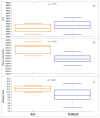Effect of Management System on Fecal Microbiota in Arabian Horses: Preliminary Results
- PMID: 40284811
- PMCID: PMC12031164
- DOI: 10.3390/vetsci12040309
Effect of Management System on Fecal Microbiota in Arabian Horses: Preliminary Results
Abstract
The gut microbiota plays a basic role in maintaining the psychophysical health and well-being of horses. Understanding the complex interactions among microbial communities in relation to age, management, and health is a topic of growing interest. The equine microbiota, given its complexity, is subject to variations caused by internal or external stressors that can lead to metabolic problems and pathologies, i.e., obesity and laminitis. The aim of this study was to characterize the fecal microbiota of 12 purebred Arabian horses and to compare the microbial communities in two distinct management systems (Group 1 = box 22 h/day + paddock 2 h/day and Group 2 = paddock 24 h). Fecal samples were analyzed using high-throughput sequencing of 16S rRNA V3-V4 amplicons. The microbiota was predominantly composed of Firmicutes (32-53%) and Bacteroidetes (32-47.8%), with Ruminococcaceae emerging as the most prevalent bacterial family (10.9-24%). Comparisons of alpha and beta diversity revealed no statistically significant differences between the groups based on different management systems. This preliminary characterization contributes valuable data for understanding the equine fecal microbiota and lays the groundwork for future studies on the relationship among intestinal microbiota and equine health, performance, and management strategies.
Keywords: Arabian horse; GIT microbiota; equine; fecal microbiota; metabarcoding; microbiome.
Conflict of interest statement
The authors declare no conflicts of interest.
Figures



References
Grants and funding
LinkOut - more resources
Full Text Sources

